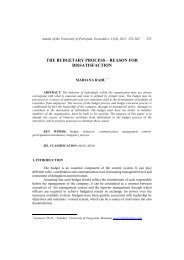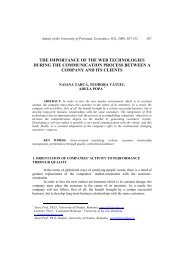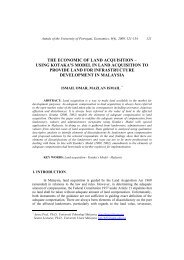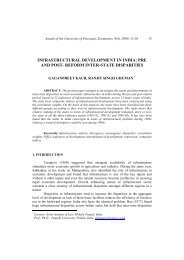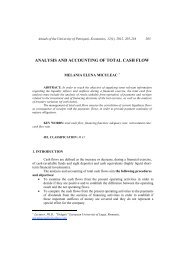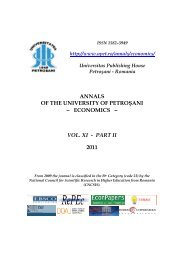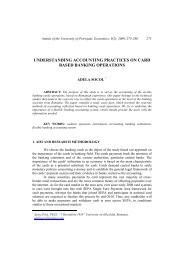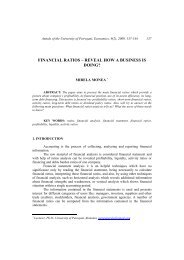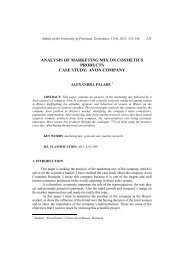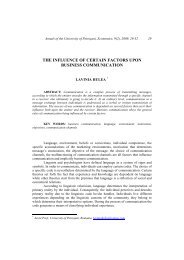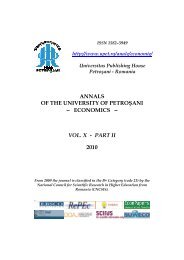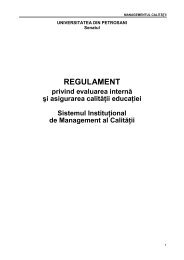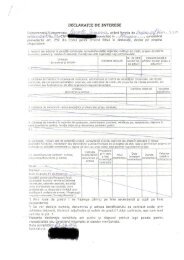annals of the university of petroÅani â¼ economics â¼ vol. xi - part i ...
annals of the university of petroÅani â¼ economics â¼ vol. xi - part i ...
annals of the university of petroÅani â¼ economics â¼ vol. xi - part i ...
You also want an ePaper? Increase the reach of your titles
YUMPU automatically turns print PDFs into web optimized ePapers that Google loves.
274 Vasile, E.; Carapancea, D.; Balan, M.<br />
Universes or contexts, in which <strong>the</strong> decisions are placed, can be grouped into<br />
four categories based on classification <strong>of</strong> <strong>the</strong> forms <strong>of</strong> uncertainty:<br />
safe universes in which case it is assumed that each action alternative<br />
corresponds to a single result, which is perfectly known by decision<br />
maker;<br />
random universes, in which <strong>the</strong> consequences <strong>of</strong> decisions taken into<br />
account are estimated to depend on a series <strong>of</strong> random events;<br />
undetermined universes, when <strong>the</strong> uncertainty is generated by <strong>the</strong> fact<br />
that <strong>the</strong> effects <strong>of</strong> intended actions depend on events over which <strong>the</strong>re<br />
is no information;<br />
antagonistic universes specific to market economy with a high level <strong>of</strong><br />
competition.<br />
Smooth and consistent conduct <strong>of</strong> activities and exchange processes implies<br />
<strong>the</strong> e<strong>xi</strong>stence <strong>of</strong> administration and management activities that are coordinated by<br />
marketing management. The decision, as an essential element <strong>of</strong> marketing<br />
management, is considered <strong>the</strong> most important tool <strong>of</strong> expression.<br />
"Marketing is a distinct and unique business operation. A firm is different from<br />
all o<strong>the</strong>r human organizations in that it promotes and sells a product or a service, "says<br />
Peter Drucker (Crainer, 2002).<br />
In general, it is estimated that achieving proper management <strong>of</strong> all marketing<br />
functions, depends largely on <strong>the</strong> quality <strong>of</strong> decisions, <strong>the</strong> merits <strong>of</strong> <strong>the</strong>ir substantiation.<br />
Appropriate decisions by which to achieve <strong>the</strong> scientific management <strong>of</strong> marketing<br />
activity, is <strong>the</strong> result <strong>of</strong> a complex process and in<strong>vol</strong>ves overcoming certain difficulties.<br />
Many <strong>of</strong> <strong>the</strong>se decisions have a unique character, in that decision makers don’t have<br />
any "historical" data, which to use in fundament with <strong>the</strong> help <strong>of</strong> <strong>the</strong> statistical<br />
methods.<br />
Moreover marketing phenomena and processes are extremely complex,<br />
<strong>the</strong>refore solutions are more difficult than in o<strong>the</strong>r areas <strong>of</strong> decision-making belonging<br />
to <strong>the</strong> enterprise. The comple<strong>xi</strong>ty <strong>of</strong> <strong>the</strong>se decisions is amplified by <strong>the</strong> fact that this<br />
type <strong>of</strong> decisions, exercising an important influence on <strong>the</strong> achievement <strong>of</strong><br />
organizational objectives, are <strong>of</strong>ten made under uncertainty <strong>of</strong> <strong>the</strong> results.<br />
The decisions in <strong>the</strong> marketing <strong>of</strong> extractive product can be grouped after <strong>the</strong><br />
nature <strong>of</strong> followed objectives into:<br />
<br />
<br />
strategic which have <strong>the</strong> character <strong>of</strong> framework decisions and are<br />
aiming at screening <strong>the</strong> way for reaching <strong>the</strong> set marketing basic<br />
objectives and <strong>the</strong> line <strong>of</strong> action that <strong>the</strong> company has settled it to<br />
follow it towards <strong>the</strong>m;<br />
operational tactic, which have <strong>the</strong> character <strong>of</strong> derived decisions and<br />
target <strong>the</strong> concrete means <strong>the</strong> company will act through to accomplish<br />
<strong>the</strong> marketing objectives subordinated to <strong>the</strong> fundamental objectives.<br />
Decisions are distinguished depending on <strong>the</strong> methodology for developing and<br />
adopting into: recurrent decisions (which are taken with a certain frequency, after a<br />
well-defined routine for <strong>the</strong>ir implementation) and non-recurrent decisions (<strong>the</strong>y have a<br />
character <strong>of</strong> novelty, unique and are carried out in a specific way in each situation).



